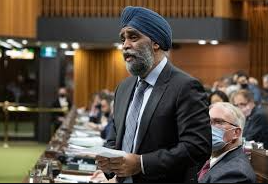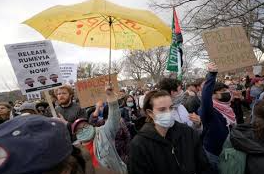
Harjit Sajjan Urges Caution, Stresses Syria Is Not Yet Safe for Refugees to Repatriate
Harjit Sajjan, Canada’s Minister for International Development, warned that Syria remains unsafe for the millions of refugees currently residing in neighbouring countries, including Lebanon. Sajjan’s comments, made during his visit to Lebanon, came shortly after Lebanese authorities unveiled plans to repatriate 15,000 Syrian refugees per month.
Sajjan’s remarks followed his visit to Jordan, where he met with Syrian refugees in camps. Over five million Syrians have fled their country since the conflict began over a decade ago, with many seeking refuge in countries such as Turkey, Lebanon, and Jordan. Lebanon, which has hosted over one million refugees, is grappling with a severe economic crisis and is eager for the return of Syrians. However, the UN refugee agency and numerous human rights organisations have strongly opposed forced repatriation, citing serious risks to refugees’ safety, with reports of individuals being detained upon their return to Syria.
“It is crucial that any return be voluntary and occur in a safe environment,” Sajjan stressed. “Based on our assessments, Syria is still not a safe place for refugees to return.” He noted that while many refugees are eager to go back home, the conditions in Syria remain perilous.
Canada has provided refuge to tens of thousands of Syrian refugees in recent years, including those from Lebanon and Jordan. Sajjan, who has a background in the military and served in Afghanistan, drew from his experiences, highlighting the devastating consequences of war that force people to flee their homes. “No one wants to leave their homes, but sometimes, they have no choice,” he said.
The call for the return of refugees has grown louder in Lebanon, where the economic crisis has left three-quarters of the population in poverty, further worsening living conditions for Syrians. Sajjan discussed the situation with Lebanese leaders, urging them to finalise an agreement with the International Monetary Fund (IMF) to secure a bailout programme. He emphasised that the IMF’s conditions for Lebanon were reasonable, given the scale of the crisis.
In addition to the economic turmoil, Lebanon is still grappling with the aftermath of the catastrophic 2020 Beirut port explosion, which killed over 200 people and caused significant destruction. Sajjan expressed hope that investigations into the explosion would resume soon, following delays caused by political interference.
“We hope the investigation will move forward in a transparent and fair manner,” Sajjan stated, acknowledging the shock caused by the tragedy, which had a global impact.












